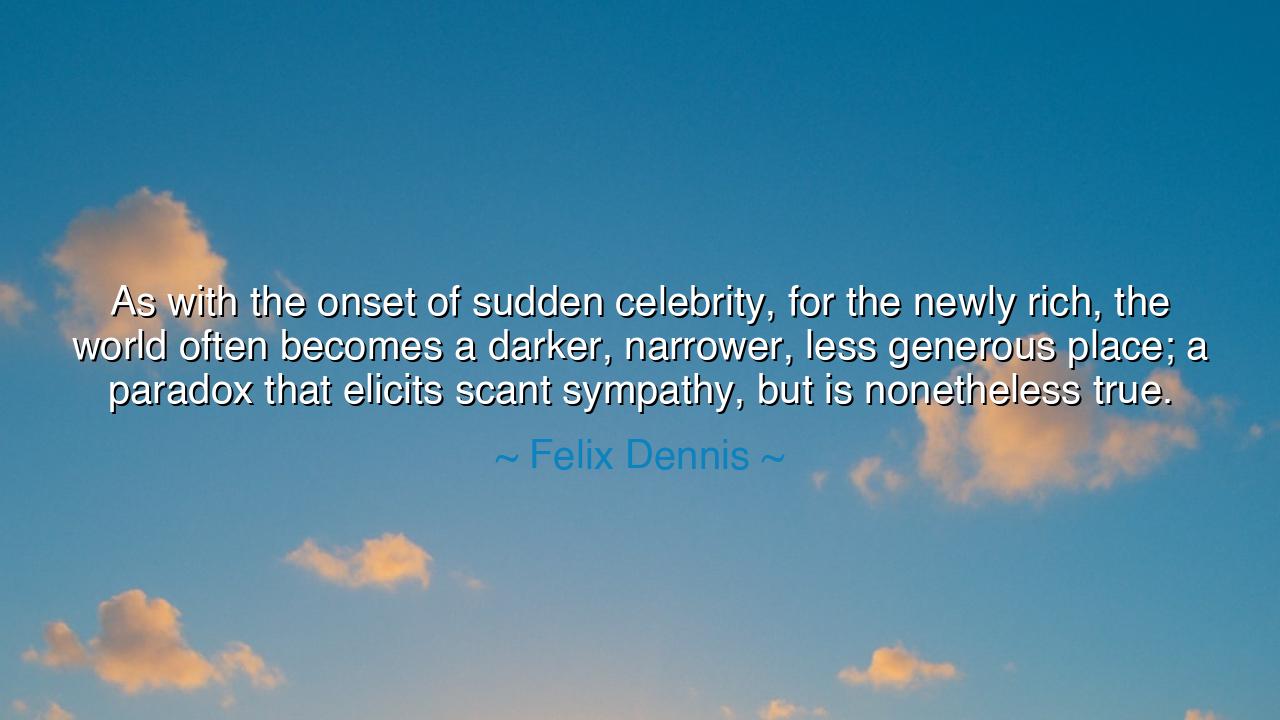
As with the onset of sudden celebrity, for the newly rich, the
As with the onset of sudden celebrity, for the newly rich, the world often becomes a darker, narrower, less generous place; a paradox that elicits scant sympathy, but is nonetheless true.






"As with the onset of sudden celebrity, for the newly rich, the world often becomes a darker, narrower, less generous place; a paradox that elicits scant sympathy, but is nonetheless true." These words by Felix Dennis reveal a profound and often overlooked truth about the nature of sudden wealth and fame. Both the newly rich and those who gain celebrity status can find that the world around them changes—not in the way they might have anticipated, but in ways that leave them feeling isolated, vulnerable, and, ultimately, disillusioned. It is a paradox that strikes at the very heart of human desire and expectation: that what one believes will bring happiness—wealth or recognition—often brings a darker and narrower existence, marked by anxiety, distrust, and the loss of privacy.
When one gains sudden fame or fortune, there is a shift in how the world perceives them. Celebrity often carries with it an invisible wall, one that separates the newly famous from those who have not experienced the same rise to prominence. This barrier—though built on the pillars of success—can feel like a prison, locking the individual into a space where genuine connections are rare, and relationships are often tainted by the motives of others. Much like the great kings of old who sought power only to find that it brought them more enemies than friends, the newly rich often find that their success transforms their world into a darker, more suspicious place, where genuine human connection is replaced by calculated gestures and superficial interactions.
Take, for example, the story of King Midas from ancient Greek mythology, whose desire for wealth led to a devastating curse. Midas, granted the ability to turn everything he touched into gold, soon found that his newfound wealth became a curse rather than a blessing. His daughter, whom he loved dearly, was transformed into gold when he embraced her. In his overwhelming desire to possess more, Midas lost what mattered most: his human connections and his ability to experience life without fear of losing everything. The story of King Midas serves as a powerful allegory for those who seek wealth or fame without considering the consequences. It is not just about acquiring wealth, but about the emotional costs that come with it—the loneliness, the fear of being betrayed, and the ultimate dissatisfaction that often accompanies too much success.
Similarly, modern examples abound of individuals who have attained great wealth or celebrity only to see their lives become overshadowed by alienation. Consider the case of Howard Hughes, the eccentric businessman and film producer. While he amassed great wealth and fame, his life became increasingly isolated and marked by paranoia, and he withdrew from the world around him. He surrounded himself with wealth, but lost much of his humanity in the process. Hughes’ story is a modern-day echo of the ancient myth of Midas—wealth and fame, rather than providing freedom or happiness, became his chains.
Dennis’ insight into this paradox challenges us to rethink what true success means. The world promises that wealth and fame will bring happiness, but for many, it brings a sense of entrapment. It is easy to think that once we acquire what we desire—whether wealth, recognition, or status—we will be fulfilled. Yet, as Dennis suggests, this new reality often comes with a cost: a narrowing of perspective, a loss of freedom, and a lack of generosity from the world that once embraced us. The newly rich are often thrust into a world where trust is in short supply, where relationships become transactional, and where the burden of loneliness weighs heavily.
The lesson embedded in Dennis' words is that true fulfillment does not lie in the acquisition of external markers of success, but in the quality of our relationships and the genuineness of our interactions. We must recognize that the pursuit of wealth and fame—while alluring—can isolate us from the very things that give life meaning: connection, love, and community. Just as Socrates warned that wealth and power, if pursued without wisdom, would lead us away from virtue, we must understand that the prize of worldly success comes with its own set of challenges. It is not enough to seek wealth or fame; we must also seek to preserve our humanity, our integrity, and our connections with others.
In practical terms, the advice of Felix Dennis calls us to balance our ambitions with a deep awareness of their costs. While it is not wrong to strive for success, we must ensure that we do not lose sight of what truly matters in the pursuit. Whether in our personal lives, our work, or our relationships, we must ask ourselves: What is the price of this ambition? If we find ourselves growing distant from those we love, or if we become isolated by the very success we sought, then we must reconsider our path. True success is not measured by the wealth we accumulate or the recognition we achieve, but by the richness of the lives we touch and the depth of the relationships we build.
Let Dennis' words be a reminder to us all: that in our pursuit of success, we must also seek wisdom and balance, recognizing that the darkness of alienation is often the cost of a life lived in pursuit of external rewards. As we climb, we must never forget the importance of connection, the richness of community, and the deep satisfaction that comes from knowing we have loved and been loved in return.






AAdministratorAdministrator
Welcome, honored guests. Please leave a comment, we will respond soon